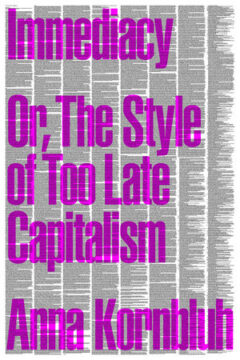 Anna Kornbluh in e-Flux:
Anna Kornbluh in e-Flux:
On January 1, 2024, the best-selling author and motivational lifestyler Gabby Bernstein launched a New Year’s “Manifesting Challenge”: “If you think it, it will come.” To “manifest” is to make evident, obvious, plain. For the self-help thought leaders and #manifest TikTokers who have popularized the term of late, this emanating is radically intransitive: no specific event transpires, only our innermost authentic selves flowing outward to a mirroring world. “Manifest effortlessly!” Google Trends shows a significant increase in this fluid emission in recent years, with sales figures and influencer follower counts to match. So why is manifesting so manifestly valuable now?
In the tradition of Marxist cultural theory, such value should be understood in connection with economic value. Whenever there is a style trend or ideological innovation with a broad grip, it bears some relation to shifts in the economy. Intransitivity, emanation, immanence—these are the spiritual guises of über-capitalist “flow,” the frictionless, instantaneous, propulsive exchange that organizes twenty-first century circulation-intensity in the wake of stagnating production. For nearly fifty years now, in the G7 economies circulation has offered a compensatory source of growth: if you can’t make new things, just exchange old things faster. “Disintermediation” is one industry term for this circulation intensification: cutting out the middleman to facilitate more fluid exchange. Imperatives for the fast, smooth, on-demand, and all-access govern a sweeping spate of twenty-first century commercial and social activities, from gig labor to self-publishing to e-brokerage. With this as the basis of current capital, it is no wonder that spiritual values, cultural logics, and aesthetic modes have come to promote doing away with mediation.
More here.
